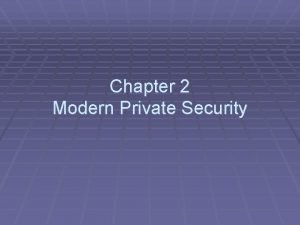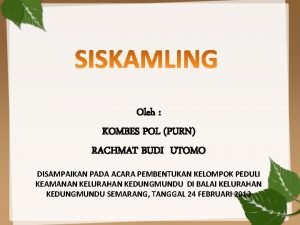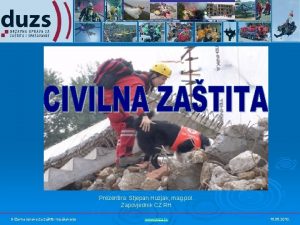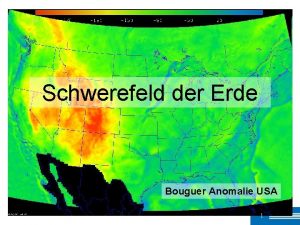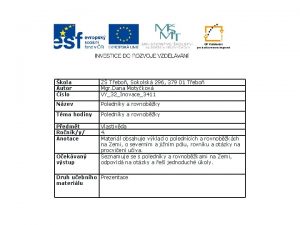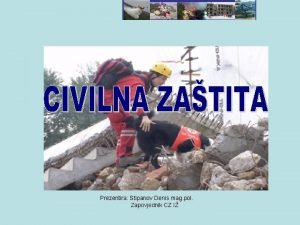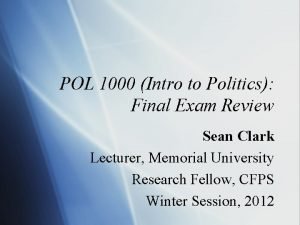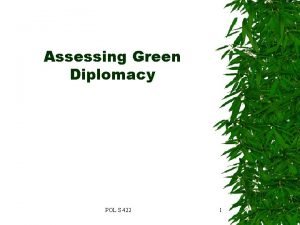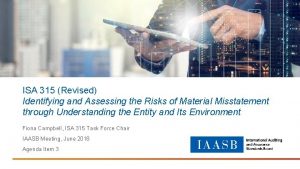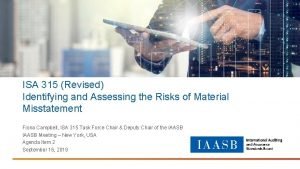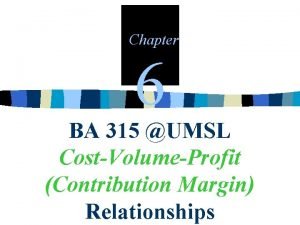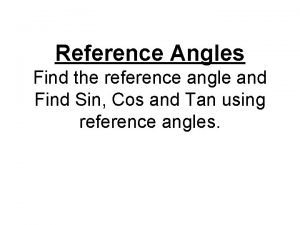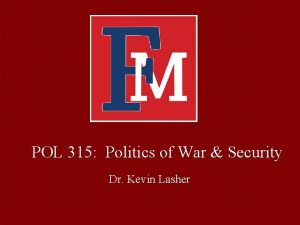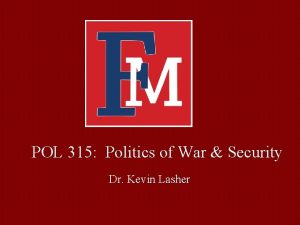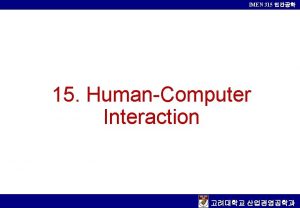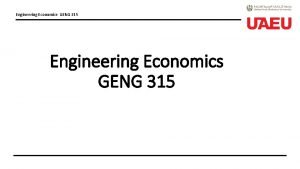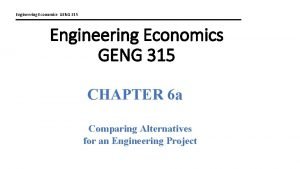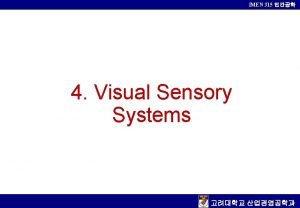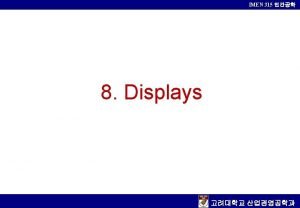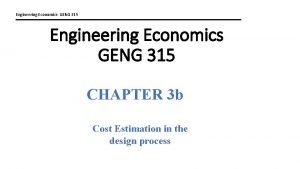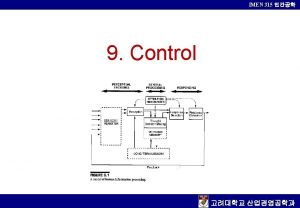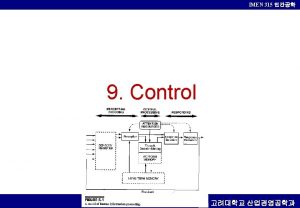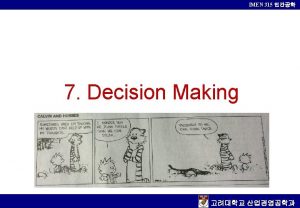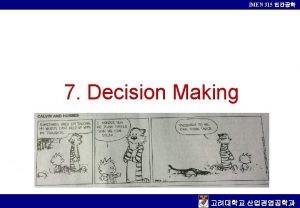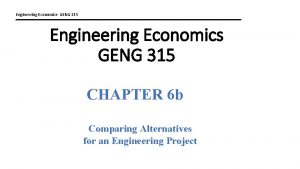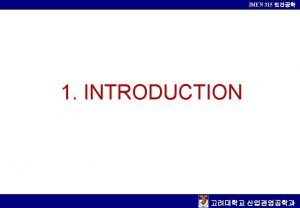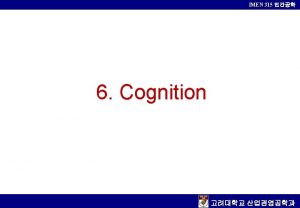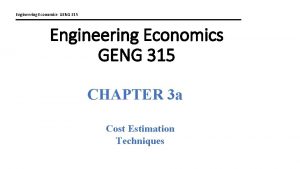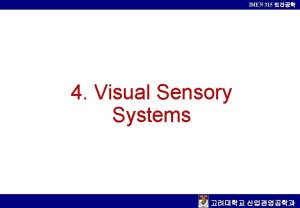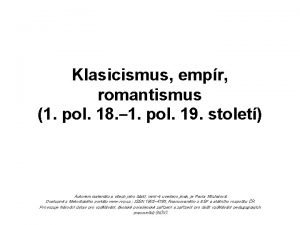POL 315 Politics of War Security Dr Kevin





































- Slides: 37

POL 315: Politics of War & Security Dr. Kevin Lasher

UN Peacekeeping Part One

Definition Peacekeeping is the maintenance of international peace and security by the deployment of military forces, especially under the authority of the United Nations, in a particular area. Helping to preserve a fragile peace that has already been established

1 st Generation Peacekeeping was not included in original charter of UN Charter: “ to save succeeding generations from the scourge of war” Became one of the main instruments by which the UN could promote peace globally Superpower Cold War limited opportunities for peacekeeping operations

1 st Generation Peacekeeping UN Secretary-General Dag Hammarskjold laid out founding principles of international peacekeeping during Suez operation of 1956

1 st Generation Peacekeeping Consent of involved parties Neutrality -- not influence the political balance between the parties Non-use of force except in self-defense Temporary nature of missions Interstate Conflict

1 st Generation Peacekeeping Observation consists of the deployment of a small number of unarmed, neutral personnel with the consent of the host state(s) to collect information and monitor activities (cease -fire, human rights, etc. ) in the deployment area, sometimes following a cease-fire or other agreement

1 st Generation Peacekeeping Traditional peacekeeping is the stationing of neutral, lightly armed troops with the permission of the host state(s) as an interposition force following a cease-fire to separate combatants and promote an environment suitable for conflict resolution

1 st Generation Peacekeeping Thirteen operations between 1948 and 1978 Observation/peacekeeping at the end of interstate wars Main operations included: India/Pakistan (Kashmir), Suez Crisis, Congo, Cyprus, Sinai, Golan Heights Several of these (India/Pakistan, Cyprus, Golan Heights) are ongoing Goals were primarily monitoring and enforcing of ceasefire agreements, separation of enemy states, preventing new conflict Congo was only intrastate version Most (not all) would be considered “successes”

1 st Generation Peacekeeping No new observation/peacekeeping missions from 19781988 Lost decade

End of Cold War Ending of Cold War allowed breakthrough in the number of peacekeeping operations End of superpower conflict encouraged countries to examine new issues, like peacekeeping

Clinton and Peacekeeping Clinton Administration initially enthusiastic at expanding US participation in peacekeeping operations (with UN) Humanitarian interventions viewed as important in the -Cold War world This enthusiasm did not last post

2 nd Generation Peacekeeping, 1988 -2000 Many more operations which went beyond traditional peacekeeping 38 operations from 1988 -2000 Peace-building, nation-building, peace enforcement Focus turned to intrastate conflicts (civil wars) versus interstate conflicts Much more complicated and dangerous missions Ad hoc procedures and improvisation

2 nd Generation Successes Namibia (1989 -90) Separation and disarmament of opposition parties following two decades of civil war Helping to create unified national army Supervising withdrawal of South African forces Resettlement of returning refugees Supervising free national elections

2 nd Generation Successes El Salvador (1991 -94) Helped to broker cease-fire agreement following a decade of civil war Demobilization of opposition sides and creation of a unified military force Establishment of Truth Commission to investigate human rights violations during civil war Creation of new national police force Supervision of national elections in 1994

2 nd Generation Successes Mozambique (1992 -94) Monitor cease-fire agreement Disarmament and demobilization of opposition forces after two decades of civil war Assist in resettlement of refugees who had fled during civil war Monitor national elections in 1994

Failures in 1990 s Somalia Bosnia Rwanda

Failures in 1990 s: Somalia in civil war chaos since early 1991 Joint US/UN humanitarian mission begun by Bush 41 in Dec. 1992 Turns into joint US/UN mission to crack down on Somali warlords in order to aid humanitarian relief Black Hawk Down incident kills eighteen Americans in October 1993

Failures in 1990 s: Somalia US troops leave in May 1994 UN troops leave in March 1995 Peace-making failure Somalia continues as one of the most extreme failed states through 2019

Failures in 1990 s: Bosnia Multi-ethnic republic in collapsing state of Yugoslavia Mixture of Croats, Muslims, and Serbs Three-way civil war begins in 1992

Failures in 1990 s: Bosnia UN establishes peacekeeping force (UNPROFOR) to protect Bosnian Muslims in city of Srebrenica (among other actions) Civil war continues and 8000 Muslims are massacred in 1995 in Srebrenica while UN forces do not respond Serb attacks also occur in other UN “safe areas”

Failures in 1990 s: Bosnia US and NATO forces replace UN forces while civil war continues US and NATO forces launch air attacks against Serbian positions in Bosnia Eventually US and NATO help to negotiate ceasefire and bring end to conflict Original UN mission (1992 -95) considered a failure

Failures in 1990 s: Rwanda UN Peacekeeping force to implement post civil war cease-fire agreement Relatively small UN force unable to prevent genocidal slaughter of Tutsis by extremist Hutus April 6 -July 18, 1994 800, 000 Tutsis (and moderate Hutus) killed, mostly by machete attacks France and other countries send in additional troops to help evacuate their own nationals

Failures in 1990 s: Rwanda Leader of UN force warns of coming crisis and pleads for an additional few thousand troops Believes that a few thousand additional troops could have prevented much of the death toll Has to be the worst failure in a group of failed missions Historian Paul Kennedy: “the lowest point in the UN’s history. ”

Failures in 1990 s: Rwanda New UN mission is sent after genocide is completed UN helps create the International Criminal Tribunal for Rwanda to try major actors involved in the genocide in the next two decades

2 nd Generation Peacekeeping, 1988 -2000 Mixture of successful and failed missions in 1990 s Perception that UN was not well-prepared for the complex, multidimensional peace operations of post-Cold War era Demands of international system far outweighed the capabilities of the UN “peacekeeping system”

The Brahimi Report, 2000 Lakdhar Brahimi, UN Diplomat An attempt by UN to bring coherence and clarity to peacekeeping operations after a decade of very mixed results “To assess the shortcomings of the existing system and to make frank, specific and realistic recommendations for change. ” Especially after failures in Somalia, Bosnia, and Rwanda 57 recommendations

The Brahimi Report, 2000 “Without renewed commitment on the part of the Member States, significant institutional change and increased financial support, the United Nations will not be capable of executing the critical peacekeeping and peacebuilding tasks that the Member States assign to it in coming months and years. ” Lakdhar Brahimi, UN Diplomat

The Brahimi Report, 2000 “There are many tasks which United Nations peacekeeping forces should not be asked to undertake and many places they should not go. But when the United Nations does send its forces to uphold the peace, they must be prepared to confront the lingering forces of war and violence, with the ability and determination to defeat them. ” Lakdhar Brahimi, UN Diplomat

The Brahimi Report, 2000 Lakdhar Brahimi, UN Diplomat Call for states to provide political support for UN A more realistic and modest approach to peacekeeping efforts Clear mandates backed up by credible force Fewer operations but better defined and implemented UN should have robust capability and be provided with means to implement mandate, ability to respond to parties who violate cease-fire provisions or otherwise harm civilians

The Brahimi Report, 2000 Improve information and intelligence for peacekeeping operations Improve mission guidance and leadership Create “rapid deployment” standards and mechanisms (short of permanent UN military force) to facilitate deployment within thirty days of UNSC resolution Lakdhar Brahimi, UN Diplomat

The Brahimi Report, 2000 Improving UN bureaucratic mechanisms overseeing peace operations Adapting peace operations to information age Lakdhar Brahimi, UN Diplomat

Brahimi Aftermath How well have Brahimi Report recommendations been implemented? Not surprisingly, a mixed bag of results The UN Bureaucracy is … Bureaucratic

Brahimi Aftermath Follow-up reports and recommendations in 2005, 2008, 2011, 2015

High Level Independent Panel on Peace Operations, 2015 “There is a collective call for urgent change in how we conceive of our peace and security instruments, how we apply them and how we work together to maximize impact. … Our action plan centers on three pillars: renewed focus on prevention and mediation; stronger regional-global partnerships; and new ways of planning and conducting United Nations peace operations to make them faster, more responsive and more accountable to the needs of countries and people in conflict. ”

High Level Independent Panel on Peace Operations, 2015 “Since its founding, the United Nations has worked to prevent, mitigate and resolve violent conflict through a range of actions, from support to human rights and inclusive development to prevention, peacemaking, peacekeeping, peacebuilding and longer-term recovery and reconstruction. The limits of our engagement are reflected in United Nations peace operations, the most visible face of the Organization. Over six decades, they have shown a remarkable capacity to adjust to evolving situations and new demands, guided by well - established principles. However, missions are struggling to cope with the spread and intensity of conflicts today, and the lack of unity among Member States over their scope and application is thwarting their adaptation. Within peace operations, the shameful actions of some individuals are tarnishing the efforts of tens of thousands. We are convinced that we can and must do more to tackle such profound challenges. ”

 Private secruity
Private secruity Pol sezan slike
Pol sezan slike Alan harper
Alan harper Pol i rod
Pol i rod Kombes pol budi utomo
Kombes pol budi utomo Pol pof
Pol pof Local guide program
Local guide program Asocijacije jezero
Asocijacije jezero Ustalanie wzoru rzeczywistego i empirycznego
Ustalanie wzoru rzeczywistego i empirycznego Pol pot
Pol pot Mag pol
Mag pol Ja som koza rohata do pol boka odrata
Ja som koza rohata do pol boka odrata Sandra cruz pol
Sandra cruz pol Bouguer anomalie
Bouguer anomalie Martine pol
Martine pol Projectontwikkelaarsresolutie
Projectontwikkelaarsresolutie Myšlenou čárou protínající severní a jižní pól je
Myšlenou čárou protínající severní a jižní pól je Pol camps
Pol camps Ryszard riedel gdzie jest pochowany
Ryszard riedel gdzie jest pochowany Mag. pol.
Mag. pol. Pol
Pol Pol
Pol Utożsamiane z mojrami
Utożsamiane z mojrami Hak pol zaczarnie
Hak pol zaczarnie Pol wolker
Pol wolker Carla buch
Carla buch Pol puare
Pol puare /pol/
/pol/ Postimpresionizam
Postimpresionizam Pol 1000
Pol 1000 Pol success ce
Pol success ce Isa 315 revised
Isa 315 revised Isa 315 summary
Isa 315 summary Margin of safety can be expressed as
Margin of safety can be expressed as Sin 240
Sin 240 Pbb dari 315 dan 825
Pbb dari 315 dan 825 Nep 315
Nep 315 Reference angle draw
Reference angle draw
